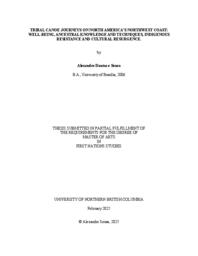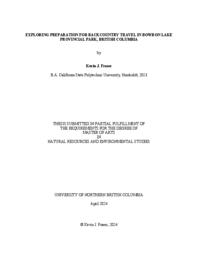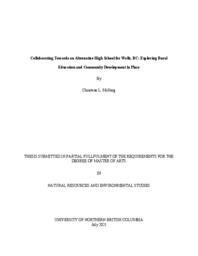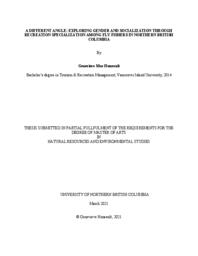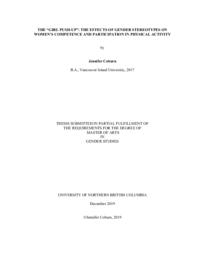Mullins, Philip
Person Preferred Name
Philip Mullins
Related Works
Content type
Digital Document
Origin Information
Content type
Digital Document
Description / Synopsis
Outdoor recreation trips have long been conceptualized as relatively linear multiplephased experiences. Previous studies of recreational activities and visitor experiences in backcountry settings have largely focused on the onsite phase. This study, however, explored the nature and elements of preparation and its influence on the backcountry experiences and meanings, as recollected by participants. Secondarily, this project aimed to better understand the roles of technology in preparation. The study used semi-structured interviews with participants who had completed one or more canoe or kayak trips in Bowron Lake Provincial Park in British Columbia, a world-renowned backcountry canoe circuit. Findings indicate that preparation is an ongoing process comprised of multiple elements by which participants are involved throughout all phases of an outdoor experience. Preparation can help improve safety and satisfaction during backcountry experiences and has important implications for recreation and leisure programs and practices, parks and protected areas management, and outdoor education. Conceptually, the research suggests that preparation is not as linear or time-bound as the five-phase model would suggest. Rather, aspects are ongoing throughout and between trips, accrued with mentorship and training over the course of a career, and involve elements of tasks and efforts beyond simply ‘planning’ trip logistics.
Origin Information
Content type
Digital Document
Description / Synopsis
Rural high schools are often the heart of rural towns, as they can have significant social, cultural, and environmental contributions to community life. The absence of a high school can impact students' mental, physical, and social health and the entire community's social and economic well-being. This research used Community-Based Participatory Research to examine rural education and community development processes using place-responsive approaches in the rural town of Wells, BC. Wells is a unique, dynamic, artsy community in the BC interior and does not currently have a high school. Results suggested that a lack of a high school in Wells had reverberating social and economic effects on individual and community life. Understanding these effects can allow community members to target unique opportunities that counter impacts. Community approaches to alternative education integrated place-responsive, community-, outdoor, and art-based education that reflected community values. These values can be incorporated into educational models and programs to respond to context-specific community desires and needs. Research results can be referred to when determining future directions for local education in Wells and inform more global applications of educational and rural place-based community development policy and practices.
Origin Information
Content type
Digital Document
Description / Synopsis
Studies of how gender is characterized, performed, and understood in outdoor activities in relation to skill development are limited, but growing. This research explored gender and social relationships across levels of recreation specialization in fly-fishing among anglers in Prince George, BC. Semi-structured interviews were conducted with 23 participants, 11 of whom then attended a level-specific fishing day during which participant observation was conducted. Interviews were transcribed and coded. Four main findings were derived. First, anglers’ social relationships shifted from dependence on others to intentional self-expression. Second, anglers learned to belong ecologically and socially through skill development and equipment use. Third, anglers’ relationships with fish moved from possession to communion. Fourth, anglers’ described escaping their daily routines to engage with rural places and fishing. The analysis and discussion show how masculinity was constructed and performed, and highlight the roles of socialization, behaviors, and equipment in shaping and gendering rural settings.
Origin Information
Content type
Digital Document
Description / Synopsis
Men are stereotyped as more physically competent than women. The stereotyping of women’s poor performance creates the conditions for stereotype threat. Stereotype threat, the fear of confirming a stereotype, can undermine women’s performances and participation in sports. Stereotype threat, however, has not been tested in strength-building activities. The present study experimentally tests whether stereotype threat undermines women’s willingness to perform unmodified push-ups and undermines their push-up performance. Women were assigned to four conditions: a stereotype-threat condition, an implicit stereotype-threat condition, a relief condition, and a control condition. Under stereotype threat, women were expected to choose modified over unmodified push-ups and, among those performing unmodified push-ups, to complete fewer push-ups than women in the other conditions. These hypotheses were not supported. During debriefings, women described their experiences related to push-ups and strength training. A thematic analysis of women’s debriefings offers insight into the gender complexities of women’s engagement with strength training.
Origin Information
Content type
Digital Document
Origin Information
Content type
Digital Document
Origin Information
Content type
Digital Document
Origin Information

